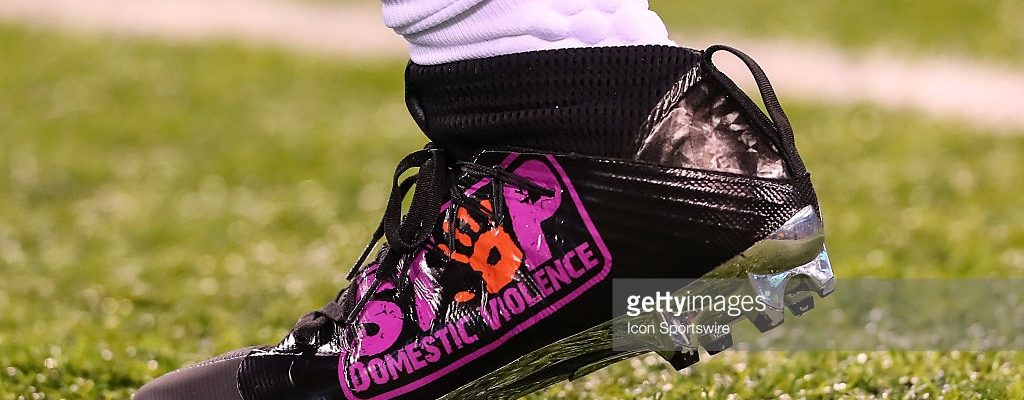We just re-read Mina Kimes’ column, The Unavoidable Dilemma of Talking About the Kansas City Chiefs’ Tyreek Hill. First, if you haven’t read it, click on the link and read. It is highly informative and furthers the important dialogue that needs to continue regarding domestic violence. This is an issue that has been around for the NFL for some time. Here is their PSA during the Super Bowl in 2015:
Obviously there is a problem. If you’re a loyal Rudin Writes frequenter, you know how we like to attack problems. First, we identify the problem. Second, we propose a solution or series of solutions if the problem so warrants.
So let’s start. The problem: There is a perverse incentive for victims of domestic violence committed by NFL players to stay quiet instead of reporting the abuse. Ms. Kimes referred us to the case of Josh Brown’s wife, who was the victim of his domestic violence.
The article also pointed to testimony delivered by another victim of domestic violence who told a state victim’s advocate she wished to drop the charges against her husband, because the last time he went to jail, he lost his job and was unable to pay child support. She stated, “I’m homeless now. I’m living at my parents’ house … I had to sell everything I own,” the woman cried, adding, “I’m just not in a good place right now.”
So how do we eliminate that perverse incentive? It’s clear again with the Ezekiel Elliott case that the NFL is incapable of handling these things. Therefore, we propose a system in which the NFL takes away the fear of losing one’s financial well-being as a result of reporting domestic violence. Of course, this system is in addition to player education as it pertains to domestic violence.
I. HOW WOULD THE SYSTEM WORK?
Both the player and the accuser will be assigned attorneys paid by the NFL. Those attorneys/law firms will be chosen via agreement by the NFL and the NFLPA. Both the NFL and NFLPA will consult with a domestic violence victims advocate group of their joint choosing and then choose the attorneys from a list of recommended attorneys by the advocate group. The attorneys will be up for joint review yearly by the NFL and NFLPA. If either has a problem with the attorneys at the time of the review, the process for choosing the attorneys will be repeated. Additionally, if either the player or the accuser wishes to use his or her own attorney, that is acceptable as well; however, the player or victim will have to pay for those attorneys.
The proceeding will be an arbitration before three arbitrators, who are chosen in a similar fashion to what we proposed here a couple of years back for how the NFL should deal with off the field discipline. We’d actually prefer a jury pool, but the odds of getting a voluntary jury pool that is unbiased is next to none for something like this.
The arbitration will have the Federal Rules of Civil Procedure and Federal Rules of Evidence applied. There are many more rules that apply to and govern arbitration, but that column is one you probably don’t want to read. Suffice to say, federal rules will apply.
The arbitration will commence with discovery. The parties will be able to conduct written discovery, which includes document production. Additionally, the NFL will produce all material that it has uncovered to both parties. Following the written discovery phase, both parties will have the ability to take the other’s deposition as well as the depositions of any witnesses they get to come forward.
Finally, the arbitration hearing will commence before the three arbitrators. An arbitration is similar to a trial for those unfamiliar. After the arbitration is over, the arbitrators will issue their ruling either via majority (two of the three) or unanimously. They will be using the “preponderance of the evidence” standard in making their decision, which is fancy legal talk for “more likely than not.” The goal will be for the process to be completed from start to finish in 120 days. The player will be allowed to play while the process is ongoing.
II. THE RULING AND PENALTIES
If the arbitrators rule in favor of the NFL player, that’s the end of the matter. No action is taken against the person who alleged the domestic violence. If the arbitrators rule in favor of the victim, he or she will receive the money garnished from the player’s wages via suspension plus a matching sum paid by the NFL. If the person has already sued civilly and received a settlement or judgment, then that amount will be deducted from the NFL system’s award.
Further, if the arbitrators rule in favor of the victim, the NFL player will be suspended for a full season. The player will have to undergo an amount of counseling to be determined by the aforementioned domestic violence victims advocate group. If, however, the player admits to committing the domestic violence prior to the inception of the arbitration process, thus saving both victim from having to endure the process and the league from the cost, the player’s suspension will be reduced by 5 games. He will still have to undergo the counseling.
Of course, this creates a new problem and perverse incentive, namely that NFL players can become targets for false accusations of domestic violence because of the windfall a schemer might get. But there is a way to deter such behavior. In the new system, all of the testimony is taken under oath before a court reporter and that oath, even in an informal setting, carries with it the same penalties of perjury as if testifying before a judge and jury in a court of law.
If it becomes clear that the person who brought the allegations has perjured himself/herself and that the charge of perjury would hold up in a criminal proceeding (e.g. beyond a reasonable doubt), the case will be referred to the prosecutor’s office. Perjury is punishable by prison time. Additionally, the person making the allegations will have signed an agreement with the NFL at the inception of the proceeding that should he/she be found to have perjured himself/herself, he/she will be subject to paying the attorney’s fees and costs related to the proceeding. Those fees assuredly will be in the six figures.
It may not be a perfect system, but it is one in which all parties are treated fairly and the victims of domestic abuse no longer have to worry about losing their livelihoods for telling the truth about the horror they endured. The process is costly and lengthy, but isn’t domestic violence worthy of such a process and shouldn’t the NFL be committing some of its vast resources toward deterring domestic violence? We think it should, and if the NFL’s stance against domestic violence wants to be something other than a PR move, it needs a system in place to deter domestic violence in a fair and judicious manner.




















hello!this is extremely good website!
Pingback: Why So Angry? Nike and Colin Kaepernick - Rudin Writes
Pingback: Amy Trask Should Be the Next Commissioner of the NFL - Rudin Writes